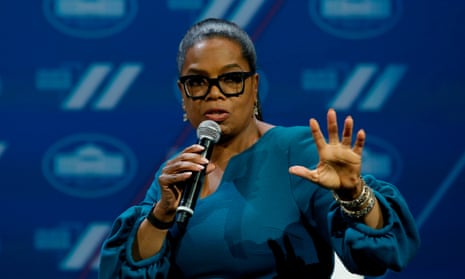In a tweet posted on Tuesday, the media mogul Oprah Winfrey promised to pledge $500,000 towards the Parkland students’ March For Our Lives rally, which will take place on 24 March in Washington DC. The aftermath of the deadly mass shooting has seen students of Marjory Stoneman Douglas high school in Parkland, Florida, call for tougher gun control measures, pleading with senators to vote against a bill protecting the right to carry assault rifles and planning a nationwide walkout on 20 April.
Winfrey has joined the ranks of public figures commending the Parkland students for their bravery and courage in the face of what’s become a typical American tragedy. In her tweet, she likened them to the Freedom Riders of the 1960s who fought against segregation and racism by riding integrated buses throughout the south.
There’s no question that solidarity from influential figures can help sustain the momentum being formed by the students. But there’s something unsettling about Winfrey’s immediate support of them, in contrast with her comments on the #BlackLivesMatter movement in early 2015.
In an interview with People for the film Selma, Winfrey accused the movement of lacking leadership, adding that it needed to “take note of the strategic, peaceful intention” which the civil rights movement used to enforce “real change”.
It’s true that Winfrey is no stranger to racism and prejudice. Throughout her career, she’s used her platform to empower young Black people, starting a scholarship fund for Morehouse College students and offering a public service fellowship for African women. But those acts don’t make up for her condescending attitudes towards an anti-racist group that aimed to tackle police brutality and global white supremacy.
Black activists are often expected to toe the line of respectability to appease bourgeois white liberal sensibilities. And while this tactic was crucial to garnering sympathy from white moderates in the 60s, it can reaffirm the idea that Black people have to go out of their way to prove they’re not inherently dangerous or threatening.
One of the key features of #BlackLivesMatter was its decision not to have a single leader on whom the fate of the movement was entirely dependent. The expectation for a Black messiah to deliver America from the sins of racism is counterproductive to the reality that it requires mass mobilization to tackle the forms of prejudice which keep marginalized communities vulnerable. Protest has changed vastly from the time of Dr King and the Freedom Riders.
That rigid standards of respectability politics are still imposed on young Black people who are also demanding not to be the victims of reckless gun usage is an example of how victimhood is often racialized in America. Like the Parkland students, both Trayvon Martin and Tamir Rice were young victims of gun violence. And yet they were never afforded the luxury of being viewed as innocent or deserving of support.
It’s been surreal to watch children and teenagers take on the politicians and organizations that have allowed them to become the casualties of political greed and lobbyist corporatism. While many of us have been heartened by the tenacity these students have displayed towards Donald Trump and conservative pundits, it’s disappointing that a figure as important as Winfrey was more than happy to welcome the resistance of predominantly white suburban kids, but dismissed that of young black protesters asking for their humanity to be seen.
Recently, a photo emerged online of a young white Parkland student with the words “don’t shoot” written on her palms. The intentions of the picture were questionable given that the phrase was conceived as a rebuttal against violence inflicted upon Black people at the hands of the police.
However, the photo showed just how much the #BlackLivesMatter movement has shaped the trajectory of popular protest in our digital world. Because without the young black protesters who put their bodies on the line for justice and equality, we may not have heard from the women who said #MeToo, and we wouldn’t be hearing from the students who are emphatically saying #NeverAgain.
- Khanya Khondlo Mtshali is a freelance writer
